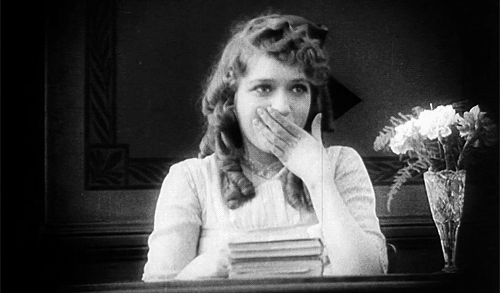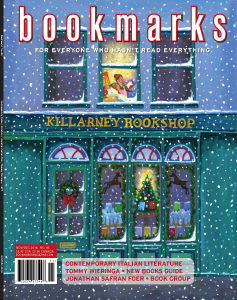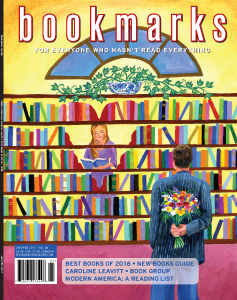Washington Black by Esi Edugyan
Remember the book tingle? To quote Simon, of Savidge Reads
There is an almost un-explainable feeling from the start which lasts until the final full stop. Not for a single moment does the book let you down, or indeed out of its grasp, you are effectively spell bound by it. It feels like all the rest of the world goes completely out of your mind and all that is left is you, the book and the author’s words. It is the prose, the characters, the atmosphere, everything! You almost feel, without it sounding arrogant, that this book was written just for you.
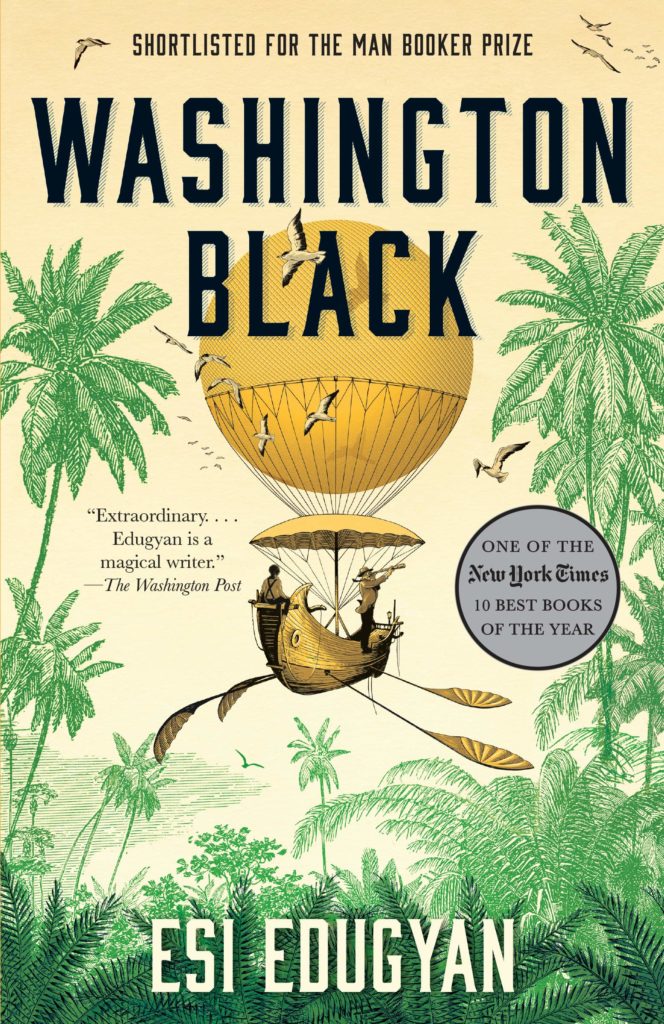
Washington Black was just one of those books for me — simply marvelous from beginning to end.
Several years ago it was named one of the NY Times 10 best books of the year, as well as one of Barack Obama’s favorite books. It got rave reviews on NPR and in the New Yorker and was up for the Man Booker Prize. With all that praise, who could withstand the pressure?
Washington Black, aka Wash, is a young slave on a Barbados sugar plantation, when he is chosen to serve his master’s brother — the eccentric Christopher Wilde. Wilde, or Titch as he’s called, is an abolitionist, but also a naturalist, explorer, and scientist. He takes the boy on a wondrous adventure that starts with a hand-built hot air balloon called a ‘cloud-cutter’ and continues by ship until, eventually, the pair finds themselves in the frozen expanse of the Arctic. While Wash is an unlikely world traveler, he is both an inquisitive observer and a gifted artist. He and Titch document species in the Arctic waters and on the frozen tundra.
When Titch disappears in an Arctic storm. Wash’s subsequent travels bring both adventures and fear as he flees a slave catcher from Virginia to Canada. He continues across the ocean to London, Europe and Morocco journeying with a new found mentor and his daughter.
Ms. Edugyan’s writing is terrific. The characters are fascinating and the settings well-drawn. From the blistering hot Caribbean sugar plantation, to the frozen Arctic, to the Moroccan desert, and even the stuffy dampness of an English drawing room — are all beautifully captured and so fully rendered that you are swept away (see book tingle above).
The author goes deep into the obvious race implications. You see, Titch originally choose this young slave boy as the perfect weight and ballast for his balloon adventure. When Titch discovers his black ballast has exceptional drawing skills, the boy’s role changes. Though they are close, there is the ever present gap in their relationship that keeps it from being a true friendship.
Wash portrays strength, determination, invention and, in the end, the capacity to understand the true meaning of freedom and how we are wholly responsible for freeing ourselves.
This is a wonderful, yet unusual book – a coming of age, adventure story blended with the brutality of slavery, the joy of art and the allure of scientific discovery. And yes, it all works – Fantastically.
The Secret Guests by Benjamin Black
I organized my Kindle books the other day. Yes, I have a Kindle and, Yes, it has hundreds many titles on it. That’s in addition to my insane extensive collection of physical books in the house.
Yes, I have a problem and, No, I will not be seeking help. That, dear readers, is why this place is called Book Barmy.

During these difficult times (are you also tired of that phrase?) publishers have moved exclusively digital for their advance readers. So, it was time to get the old Kindle organized and in doing so, I discovered a book I read in January and never told you about. (I’ve since created a folder on the Kindle called ‘books read’ — see “duh” above.)
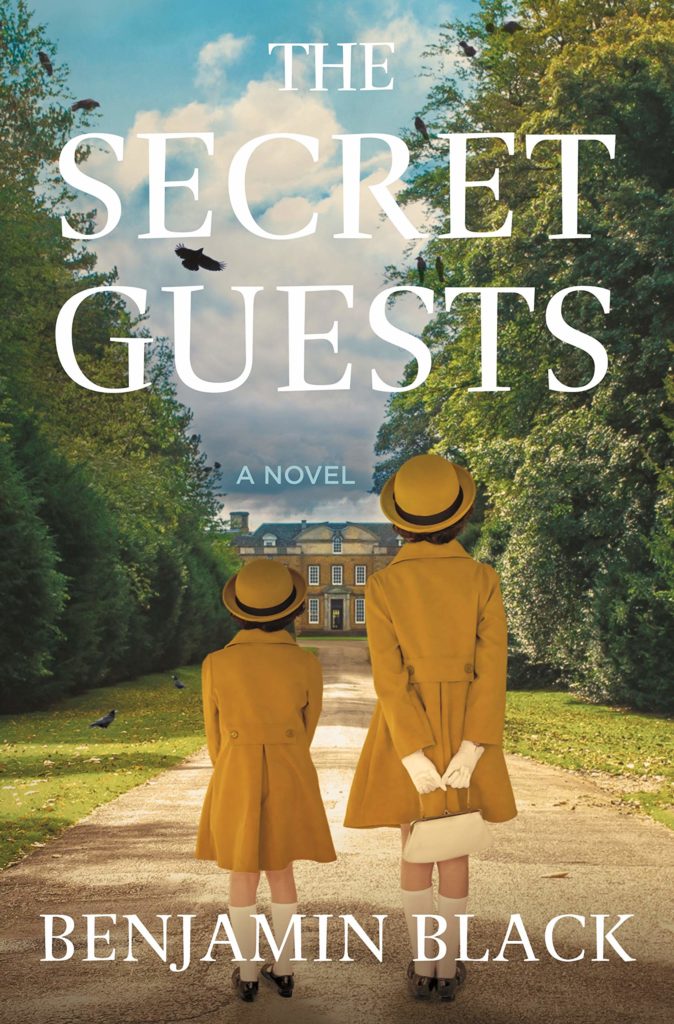
The Secret Guests, by Benjamin Black
During the blitz, the British royal family, including the young princesses, Elizabeth and Margaret, hunkered down at the palace to weather out the attacks. The Secret Guests however imagines a fictionalized alternative scenario. In this novel, Elizabeth and Margaret are secretly sent away to a rundown estate belonging to a distant cousin located in war-neutral Ireland. The princesses are called Ellen and Mary, and are accompanied by Celia Nashe, an MI5 agent, posing as their governess. Once they reach Ireland, Detective Garda Strafford a local Irish police officer, is also assigned to their protection.
They arrive at the decrepit Edenmore Castle and are greeted by their host, the bewildered and entitled Sir William and his servants. The girls settle in, while Celia and Detective Strafford attempt to get used to protecting the young royals.
He found it slightly uncanny to be in their presence; they still seemed to him figures from some famous old painting who had come magically alive.
The girls explore the castle and grounds, discovering horses to ride (Elizabeth) and barns to sneak cigarettes (Margaret). The staff start to wonder about the girls, there’s gossip in the village, and the local IRA group becomes suspicious. Is there a plot to kidnap the princesses? Who actually knows their true identity?
Billed as an “enthralling historical mystery”, and as fan of anything about the Royals (I adored watching The Crown) I had high hopes for this novel. But somehow The Secret Guests missed the mark for me. Benjamin Black, the pen name of the acclaimed novelist John Banville, has a poetic and atmospheric writing style, but oh dear readers, the suspenseful plot soon became plodding and often dull.
That’s not to say I didn’t finish it — I did in fact. I was still interested in what was going to happen to the girls — especially the young Princess Margaret — whose character was brave and spirited – already forming her future free and often reckless personality. Elizabeth, on the other hand, is already shouldering the weight of her responsibility as the future queen – she is formal and stiff. I did appreciate the conflicting viewpoints of Ireland and the English during that time period. But, then when I got to the end of The Secret Guests, it felt rushed and out of the blue.
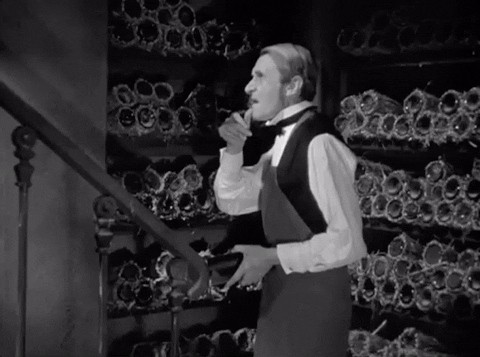
Now I know why I didn’t tell you about this January read –I totally forgot I read it.
A digital review copy was kindly provided by Henry Holt via NetGalley.
Do not despair, I am engrossed in two books at a time right now. An page turning thriller and one of Obama’s favorite books. Absolutely loving both. More later.
Reasons ~ so many reasons…
Book Barmy’s absence can be explained– but not forgiven. I apologize to one and all…and thank you for your notes of inquiry. Not to worry, Husband and I are healthy and staying safe.
My life has been distracting – eliminating any focus or relaxation, and thus, any reading.
Suffice it to say it’s been a weird recipe; turn on March through July, introduce our neighborhood battle against nighttime stadium lights across the street, simmer with subtle but constant virus worry, stir in black lives matter, whipped up by current politics, add slowly heating election jitters — but the final ingredient – the final blow
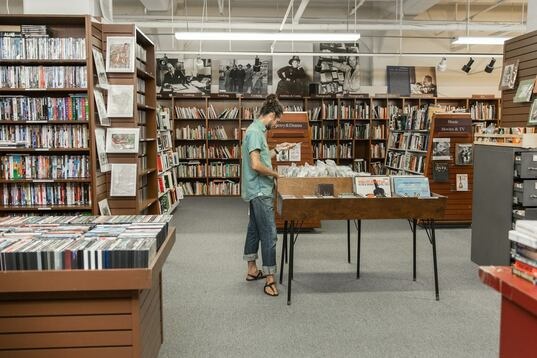
… my beloved Friends of the SF Library Bookstore has had to close – permanently. Covid 19 shut it down in March. As a non-profit, the bookstore’s margins were tight to begin with, the few paid staff had to be laid-off, and the retail space lease could not be maintained (SanFrancisco = expensive). I know it was a tough and heartbreaking decision for the organization — but they couldn’t see any way through.
Readers of Book Barmy will know of my joy with volunteering/working at this wonderful little gem of a bookstore. I had my favorite customers and wrote of one young one I’ve watched grow up over my years there. Re-visit those posts HERE and HERE
During my hectic and often soul-shattering career, I would make lists of things I would do with my life if I didn’t have to work…doesn’t everyone? Anyway, always, always at the top of every list was ‘work in a bookstore’. It started out as ‘own a bookstore’ but I got wiser with age (ha, not really).
When I did finally walk away from grind of work, I heard that the Friends of the San Francisco Public Library was looking for bookstore volunteers. I leapt to fill out the application, was interviewed, and accepted. That was back in 2003. I’d been working as a volunteer in both their bookstores* and the Friends big book sales ever since.
It was the perfect gig; great schedule — one day a week – maybe two, time off for travel whenever I wanted, learning about books – especially old books, helping customers find books (I’m looking for the book about a tiger and boy on a raft in the ocean), shelving books, talking about books, and most of all, being surrounded by books.
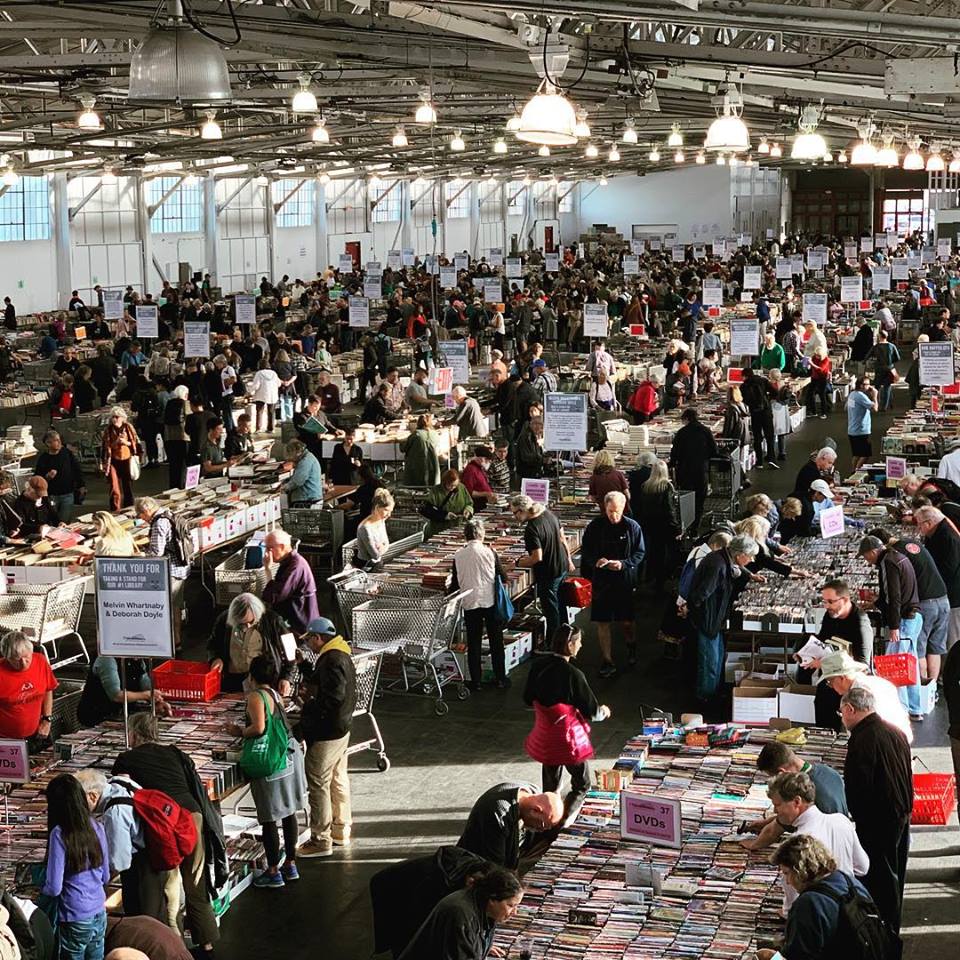
Also, the Big Book Sale won’t happen this year (for obvious reasons) and is in question for the future…

I’m trying hard to be a grown up and buck up about all this but— truth be told — I’m really sad –
When the library system fully re-opens again – some day – who knows when, I’ll look into volunteering directly with the library system itself. There’s a book mobile that used to be in front of the SF zoo once a week. It’s a nice walk, and maybe, just maybe, that will work out. To quote Robert Frost — I always entertain great hopes.
There you go, the valid reasons for Book Barmy silence all spelled out — but it’s still embarrassing.
Book Barmy will once again resurface, I have books to tell you about and short trip up the coast planned – so please do have patience and stick with me here.
I promise, Book Barmy will be ~~~ well ~~~

(*the other bookstore is (sob) was in a little corner of our SF main library and it may, or may not, re-open)
The Orchardist by Amanda Coplin
Back to regular programming. I’ve been slowly dipping my toes back into reading and rediscovered what all readers know – books, and reading, are a vital survival tool. A way to get through what can be, may be, is, an overwhelming world right now.
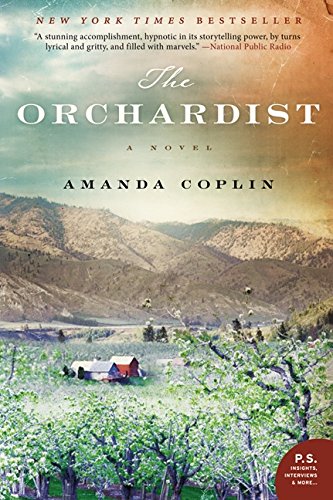
I picked up the The Orchardist based on a friend’s recommendation and found it a quiet book which immediately absorbed me. I love ‘quiet’ books – books that pull the reader in with well crafted prose.
At the turn of the 20th Century, William Talmadge is a loner who tends his family’s fruit orchards in the Pacific Northwest. One day, two skittish and half-starved young girls, both pregnant, descend upon his orchard scavenging for food. He leaves plates of food and he sets out bedding in a cabin for them, but they prefer to sleep outdoors. Slowly the girls recognize that Talmadge is a kind man and start to interact with him.
It turns out that the girls, Jane and Della, have escaped a brothel run by a sadistic man who, when he discovers they are gone, goes on a hunt to bring them back. Talmadge must step out of his own safe world, this loner has to engage with others, and enlist help to try and protect the girls and their babies. This sets him on a course that changes his life forever. And it’s quite a life story which unfolds in The Orchardist.
Ms. Coplin’s debut novel has a unique, spare style of writing. There are no quotation marks – but then again there is very little dialogue. Her prose is quietly lovely with a profound sense of place and nature. The imagery of the orchards located in a valley in the Pacific northwest is simply gorgeous.
The story unfolds like a Greek tragedy. The characters are given time to develop, but remain slightly mysterious and imperfect. Because the characters are scarred and detached — their interactions (or their failures to interact) are a key part of the story.
The novel gives us a look at how a non-traditional family comes together. It takes a moving look at the lost chances, the lost opportunities when people who care about one another are not able to fully trust, engage, or evolve.
This is one of those novels that when you put it down, it will take a few moments to return to the real world. It’s a beautiful, moving, yet gritty tale of nature, family and humanity.
If you’re looking to loose yourself in an absorbing novel — I highly recommend The Orchardist.

No escape
Book Barmy is supposed to be a refuge, a secluded little place where you can come to read about books – an escape from the harsh realities of the real world.
I can’t give you that right now, nor do I want to. I can’t hide behind talking about books. I can’t escape into a light read, I can’t even offer you an escape – there is no escape. This is a harsh time right now.
I’ve never been intentionally racist, but as a white person of privilege, that is not enough – that’s the bare minimum and a mere fraction of what I should be doing.
I can’t stay silent about this any longer — we are and we have to be better than this. I am joining the uproar over a police officer nonchalantly killing a black man over $20. I stand in agonized allegiance against the blatant disregard of so many black lives.
A recent NY Times survey revealed the majority of Americans say they have a favorable view of Black Lives Matter and they believe this movement is here to stay for a long time. (Unlike support for gun control, which spikes after mass shootings, but typically ebb as soon as memories of the bloodshed fade.)
So, Book Barmy what are you actually doing? Well, I’ve never been able to join protests – ever. The crowds, the few idiots and now with the combined threat of the virus, rubber bullets and tear gas – I just can’t. Those protestors out there right now are braver and stronger than I will ever be.
I’ve signed the petitions, joined a local citizens group working to reform police procedures, donated money, and most importantly, because I don’t have a PhD in race relations, I’m educating myself.
Like you, I’m a reader so, beyond good journalism and The New York Times with my morning tea ~~ I’ve put together a reading list.
Because if Black Lives Matter — so do Black Stories.
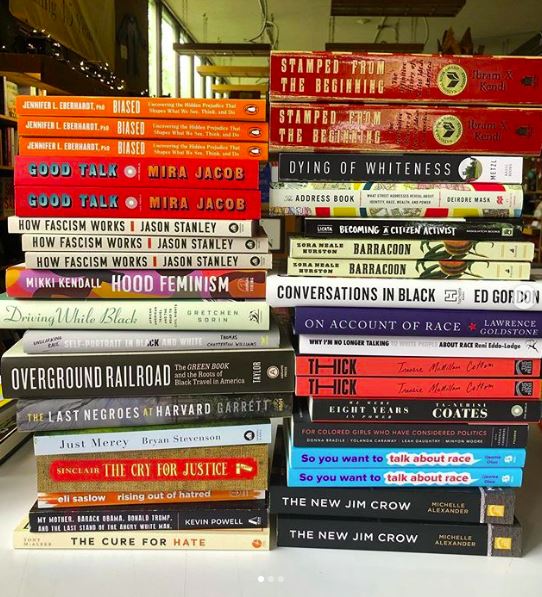
Here are the reading lists I’m going to pick and choose from – maybe you’ll want to do the same?
It’s not much I know, there’s so much more I could do. But I’m feeling inadequately informed and I need to remedy that. It’s a first step.
I suspect I’m going to hear about this post and I look forward to your comments. Please, however don’t say but all lives matter – yes, that’s true, but this tells us why it’s cruel.

I’ll leave you with one last thought. I remember years ago, talking to a black friend who said he had to have ‘the talk’ with his 12 year old son, and I assumed he meant the sex talk. Because he’s a friend, he very kindly explained to this white woman that, no, the talk was about how to act when his black son would inevitably be targeted or detained by the police.
Here’s a three minute video of actual parents quoting their ‘talks’ – it’s heartrendingly powerful HERE
Bookmarks Magazine
I’m re-posting here today, because Bookmarks Magazine contacted me to tell me they have upped their game. They’ve refreshed their website (see link below) and have a new toll free number. It’s still my favorite magazine and I happily dive right into the issues when they arrive. If you’re a reader and like me — barmy about books — Bookmarks should be your magazine of choice.
Here’s my previous post with updated website and phone number.
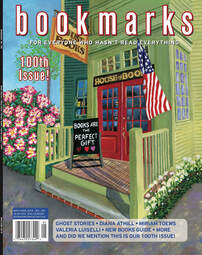
I became addicted to magazines during my advertising gigs in the 1980’s and 90’s. I’m talking about curl-up-and-slowly-turn-the-glossy-pages, real magazines. Back in those ancient times, magazines were a mainstay media outlet for advertisers. As a benefit, I was on many complimentary subscription lists. From Good Housekeeping to Vanity Fair to Tennis Magazine — they piled up waiting for the quiet evening or foggy afternoon when I could curl up and browse them.
Many magazines are now long gone, and most have moved to digital editions. Nonetheless, I’m still addicted to real magazines, I buy them off the newsstand from time to time, and still subscribe to a few magazines – sadly no longer complimentary, but funded out of my own Book Barmy budget.
That’s hysterical, you really think I stick to a budget?
But, back on subject — Bookmarks Magazine is my favorite magazine. I’ve been a subscriber since they launched in 2002. A small publication dedicated to readers, bookgroups and librarians — with the charming mantra For Everyone who Hasn’t Read Everything.
I do a little dance when it arrives in the mail. Just look at the fun covers.
What’s unique about Bookmarks is they gather and summarize a wide range of published book reviews (good and bad) and summarize those reviews. So a voracious bibliophiliac reader, like myself, can make decisions on whether or not to seek out a newly published book (see Book Barmy budget above).
They also have their own articles and book recommendations such as Books You Missed and Shouldn’t Have, Great Forgotten Mysteries, and Non-fiction Must Reads.
They always profile a book group (with a fun group photo), their reading list, with favorite and least favorite reads over the years of the book group.
Regular readers recommend their own list of 10 books, grouped under the heading “Have You Read?“.
You can subscribe via Bookmarks Magazine or phoning (888) 721-2402
And, if I can’t convince you to subscribe – maybe Kurt Vonnegut can:
He weighed in on Bookmarks Magazine — after one of their first issues featured a profile on his life and works;
….the first publication to summarize my career as a writer. I am beguiled by your physical beauty and I am moved by how head-over-heels in love with books you are. And nowhere else have I found such thoughtful and literate reportage on the state of the American soul, as that soul makes itself known in the books we write. News of the hour indeed!
A Gentlemen in Moscow by Armor Towles
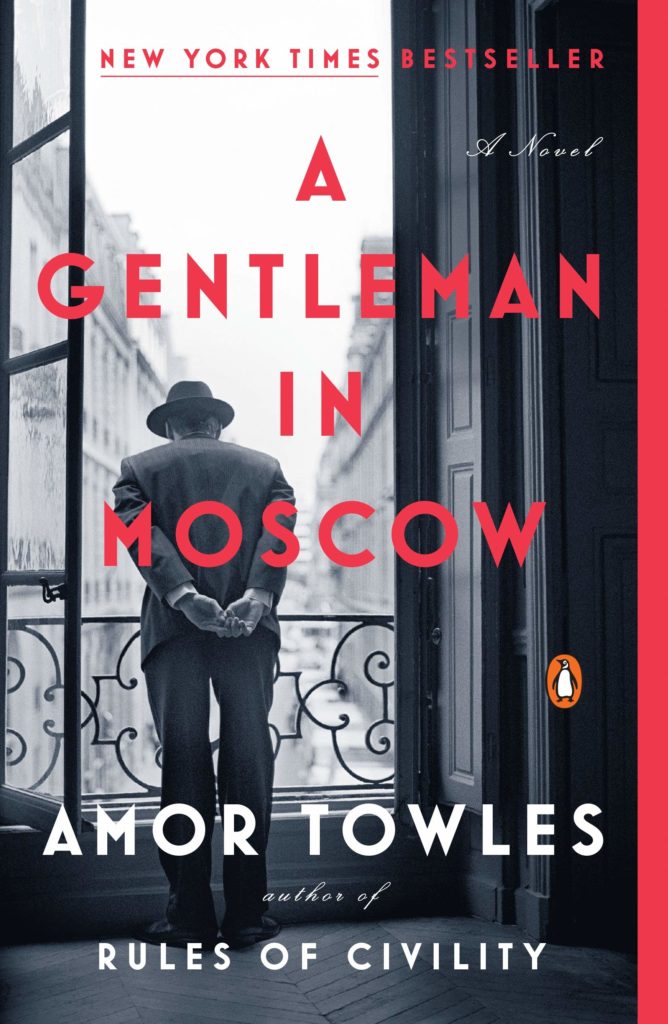
And now the ‘miss’ ~~
When we first entered this strange phase of our lives, I roamed my bookshelves – picking out books and planning my reading list for the duration. A Gentlemen in Moscow seemed like the perfect book — given we were all entering what appeared to be our own sort of house arrest.
In 1922, Count Alexander Rostov aged 33, is brought before a Bolshevik tribunal in Moscow. He is charged with being an unapologetic aristocrat — but because of his charm, and a carefully recited poem — instead of death, he is condemned to lifetime house arrest in his current place of residence: the Metropol Hotel. Removed from his suite and banished to a tiny room in the attic, the Count finds his material circumstances have been much reduced, but he faces his change in fortune philosophically.
The novel starts in a somewhat breezy style as we are introduced to the varied characters that move in and out of Rostov’s life as he is sequestered in the grand hotel. There’s a famous model, an overly bright little girl, and an officious general manager. I chuckled along as the Count’s days are spent anticipating his meals in the restaurant, laboriously making his way through The Essays of Montaigne, or anticipating his weekly haircut appointment.
It was initially charming to read about the Count’s interest in a bouillabaisse recipe, his fascination with wine, and his philosophical observations on the parade of people populating the hotel. But then, about two-thirds of the way through A Gentleman in Moscow, I realized that is all this book is about.
Don’t get me wrong, Mr. Towles is an excellent writer, there are some lovely passages which made me sigh with pleasure and re-read:
For what matters in life is not whether we receive a round of applause; what matters is whether we have the courage to venture forth despite the uncertainty of acclaim.
On those we love:
Every year that passed, it seemed a little more of her had slipped away; and I began to fear that one day I would come to forget her altogether. But the truth is: No matter how much time passes, those we have loved never slip away from us entirely.
Mr. Towles focuses almost entirely on the charming life of the Count locked in his grand Moscow hotel. I, however, kept wondering about what was unfolding outside the hotel’s doors. What about the tumultuous decades in Russian history? The plight of millions of Russians starving and being put to death by the Stalinist regime, not to mention two World Wars. That is the author’s choice, and I respect that, but this reader would have liked more historical reference. But that would have perhaps required a plot — and A Gentleman in Moscow is not a plot driven book – this is a lumbering (462 pages) character study about a character that I just didn’t find that interesting.
I put the book down, feeling like I, too, was imprisoned in the Hotel Metropol. Its premise held great promise, but it didn’t hold my attention. In a word, I got bored. My hair literally went gray waiting for something to happen (no recent hair appointments, not withstanding) ~~ reader, I gave up.
Annalisa Quinn’s review on NPR sums it up best:
“A Gentleman in Moscow is like a quipping, suavely charming dinner companion that you are also a little relieved to escape at the end of the meal.”
Other readers, whom I respect, have told me the novel is worth it for the ending alone – so I may start it up again – or (ssshhhh) jump to the last few chapters. Who knows? If I change my mind about A Gentleman in Moscow, I’ll be sure to let you know.
Until then, I’m going to find something to read where something actually happens.


